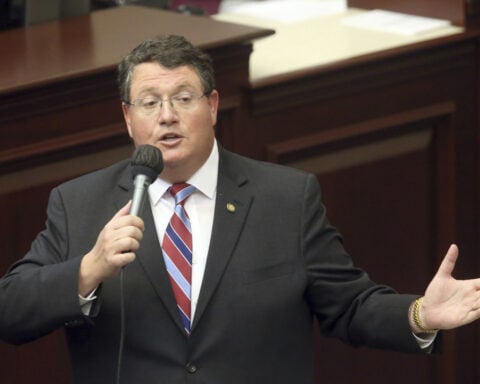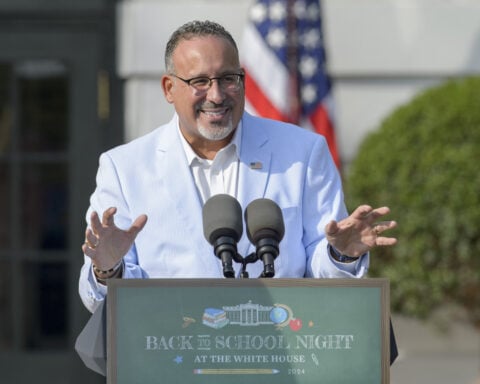The passage of the Every Student Succeeds Act in 2015 eliminated the federal requirement that teachers be highly qualified to teach. This regulatory freedom, combined with a shortage of trained and qualified teachers, has led some states to allow unqualified people to teach children.
Texas used this freedom to adopt a new state law that allows almost any school to hire unlicensed teachers. As a result, Texas schools now hire more unlicensed new teachers than licensed ones. The supply problem is especially acute in rural and small-town schools, where almost 75% of new teachers hired in 2023-2024 were unlicensed. This is up from 17% in 2013-14.
Research shows, however, that these unregulated hiring practices can have a negative impact on students’ academic achievement. It disproportionately affects Black students, English learners and rural students.
Why does it matter?
What’s required to get a teaching license varies by state, but for the most part all states require licensed teachers to have at least a bachelor’s degree. Many also require prospective teachers to complete a certain number of hours of student teaching and take a test as well.
While the practice of hiring unlicensed teachers may fill an immediate staffing need in classrooms, research shows it has a number of negative consequences.
First, unqualified new teachers negatively impact student learning in middle and high school math. The learning loss that students experience is equivalent to missing up to three months of instruction during a nine-month school year.
Second, unlicensed new teachers quit teaching at much higher rates than licensed and qualified new teachers. Only 45% of unlicensed new teachers in rural communities stay in teaching beyond three years, while almost 80% of fully qualified new teachers continue in the profession. The high attrition rate for unlicensed teachers is disruptive to schools and can lead to lower student test scores. And teacher turnover is expensive, costing school districts US$9,000 to $21,000 to hire and train a replacement for each teacher who leaves.
Third, unlicensed teachers in Texas can earn the same salary and benefits as fully trained and licensed teachers and remain employed indefinitely. As a result, this new state law removes the incentive for people to invest their time and money in getting trained and licensed to teach. In the long term, this is likely to further erode the supply of highly qualified teachers.
Finally, Texas law requires public schools to provide equal educational services and opportunities to all children. Federal law says all children must “receive a fair, equitable and high-quality education.” Despite these laws, unqualified new teachers in Texas are 1.4 times more likely to teach Black students than white students, 2.1 times more likely to teach emergent bilingual students than native English-speaking students and six times more likely to teach students in rural communities than in suburban communities.
What’s next?
Three changes to state policy and practice could result in higher student achievement, a greater supply of highly qualified teachers, better government transparency and lower costs to taxpayers.
Since 1999, Texas law has required schools to notify parents and guardians when their children are taught by “inappropriately certified or uncertified teachers.” However, the new state law allows school districts to exempt themselves from this government transparency clause, and nearly 400 had done so as of March 2024, based on our calculations using state data. If Texas legislators removed this exemption, parents would be empowered to ensure their school districts were taking positive steps toward hiring more licensed teachers.
One way to potentially reduce the educational harm of employing unlicensed teachers is to cap how long they can teach before they must get licensed. Before 2015, school districts were required to request an emergency permit from the state for unqualified teachers when the district was unable to fill an open teaching position with a licensed teacher. These permits are valid for only one year. This time limit could also be applied to all unlicensed teachers being hired now.
Under Texas law, school districts can pay teachers differently based on their qualifications. If most school districts created tiered teacher pay scales – where the salary for fully qualified teachers is higher than for unlicensed teachers – then this could provide additional incentives for unlicensed teachers to become fully trained and licensed.
In addition, rural and small-town schools currently struggle to hire highly qualified teachers because they compete with wealthier and larger school districts. Differentiated state funding that enables rural and town districts to offer similar salaries for qualified teachers could also help level the educational playing field across the state.
Collectively, these three policy changes could help increase the supply of highly qualified and effective teachers who stay in the profession for longer, especially in rural schools. This in turn could lower costs to school districts and ensure all students get the equitable and high quality education they are entitled to by law.
James P. Van Overschelde is co-founder and co-executive director of the Research for EDucator Equity & Excellence Center at Texas State University. Dr. Van Overschelde consults with organizations that are involved in teacher preparation and he receives grant funding from numerous sources to conduct rigorous mixed-methods research on teacher preparation, teacher employment, and student achievement.
Minda Lopez is co-founder and co-executive director of the Research for EDucator Equity & Excellence Center at Texas State University. Dr. Lopez consults with organizations that are involved in PK-12 education, teacher preparation, and teacher training. She receives grant funding from numerous sources to conduct rigorous mixed-methods research on teacher preparation, teacher employment, and student achievement.
Source: The Conversation

 Germany's economy shrank for the second consecutive year in 2024
Germany's economy shrank for the second consecutive year in 2024
 Italy, Albania, UAE sign deal for energy subsea interconnection
Italy, Albania, UAE sign deal for energy subsea interconnection
 European shares advance as bond yields ease; soft inflation powers UK stocks
European shares advance as bond yields ease; soft inflation powers UK stocks
 Bayern Munich signs US youngster Bajung Darboe from LAFC
Bayern Munich signs US youngster Bajung Darboe from LAFC
 Novak Djokovic breaks a tie with Roger Federer for the most Grand Slam matches in tennis history
Novak Djokovic breaks a tie with Roger Federer for the most Grand Slam matches in tennis history
 China's RedNote: what you need to know about the app TikTok users are flocking to
China's RedNote: what you need to know about the app TikTok users are flocking to
 English language learners are among the most likely to be assigned to unqualified teachers in Texas.
English language learners are among the most likely to be assigned to unqualified teachers in Texas.







